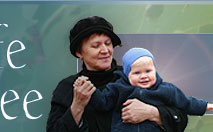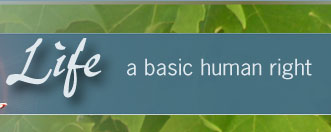|

Vatican Response to USCCB Raises Serious Concerns About New Law in North Carolina
September 19, 2007
Dear all,
We regret to report that the Advance Directives/Health Care POA bill in NC (S1046 which later became H634) passed and was signed into law by the Governor last month. The Congregation for the Doctrine of the Faith (CDF) recently released its answers to two questions about artificial nutrition and hydration posed by the US Conference of Catholic Bishops in July, 2005 after Terri Schiavo's death. The document makes it clear that H634 is basically flawed because it invites choices which violate the moral natural law.
The full text of the CDF response to the USCCB and the Commentary are featured in the column to the right, under "Related Reading ." The CDF document states that the artificial administration of water and food must be considered ordinary care aimed at the preservation of life and is morally required as long as it is physically possible and as long as water and food can be assimilated and appropriated to support life.
The commentary reviews many high level statements from the Vatican over the years which consistently emphasize that artificial nutrition and hydration cannot be denied a patient if they will sustain life.
As we consider advance directive legislation, the Church teaches that we do not have the moral authority to sign a document (advance directive) that explicitly allows health care providers to dehydrate or starve us to death. It is clear. The Church teaches that we cannot authorize through living wills, health care powers of attorney, POLST/MOST forms, etc. the withholding or withdrawing of artificial nutrition and hydration under the vague conditions permitted by the legislation.
Take for example the conditions in the new NC standard Living Will form. Called an "Advance Directive for Natural Death," the standard living will form in H634 invites the declarant to authorize the withholding or withdrawing of life-prolonging measures, which include artificial nutrition and hydration, if the declarant
a) has an incurable or irreversible condition that will result in the declarant's death within a relatively short period of time, or
b) becomes unconscious and, to a high degree of medical certainty, will never regain consciousness, or
c) suffers from advanced dementia or any other condition resulting from the substantial loss of cognitive ability and that loss, to a high degree of medical certainty, is not reversible.
For the record, nowhere in the bill are terms such as "relatively short period of time," "to a high degree of medical certainty" or "advanced dementia" ever defined.
These three conditions stand in stark contrast to the conditions listed in the CDF document below explaining the very limited circumstances under which artificial nutrition and hydration can be withheld or withdrawn.
Taken from the second-to-last paragraph of the Commentary:
When stating that the administration of food and water is morally obligatory in principle, the Congregation for the Doctrine of the Faith does not exclude the possibility that, in very remote places or in situations of extreme poverty, the artificial provision of food and water may be physically impossible, and then ad impossibilia nemo tenetur.However, the obligation to offer the minimal treatments that are available remains in place, as well as that of obtaining, if possible, the means necessary for an adequate support of life. Nor is the possibility excluded that, due to emerging complications, a patient may be unable to assimilate food and liquids, so that their provision becomes altogether useless. Finally, the possibility is not absolutely excluded that, in some rare cases, artificial nourishment and hydration may be excessively burdensome for the patient or may cause significant physical discomfort, for example resulting from complications in the use of the means employed.
Also of grave concern is that H634 codifies the MOST (Medical Orders for Scope of Treatment) form which will be prominently displayed on the patient's medical chart. The MOST form contains a list of choices regarding medical treatment. Here is a sample menu of treatment limitations, one box is to be checked per section:
| |
Section A |
Cardiopulmonary Resuscitation |
The (2) boxes are:
 Attempt Resuscitation or Attempt Resuscitation or
 Do not Attempt Resuscitation Do not Attempt Resuscitation |
| |
Section B |
Medical Interventions |
The (3)boxes are:
 Full Scope of Treatment (Transfer to Hospital if indicated ) or Full Scope of Treatment (Transfer to Hospital if indicated ) or
 Limited Additional Interventions (Transfer to hospital if indicated. Avoid Intensive Care) or Limited Additional Interventions (Transfer to hospital if indicated. Avoid Intensive Care) or
 Comfortmeasures only ( Donot transfer to hospital unless comfort needs cannot be met in current location). Comfortmeasures only ( Donot transfer to hospital unless comfort needs cannot be met in current location). |
| |
Section C |
Antibiotics |
The (3) boxes are:
 Antibiotics if life can be prolonged or Antibiotics if life can be prolonged or
 Determine use or limitation of antibiotics when infection occurs or Determine use or limitation of antibiotics when infection occurs or
 No Antibiotics (use other measures to relieve symptoms)
No Antibiotics (use other measures to relieve symptoms) |
| |
Section D's first column |
Medically Administered Fluids and Nutrition |
The (3) boxes are:
 IV fluids long-term if indicated or IV fluids long-term if indicated or
 IV fluids for a defined trial period or IV fluids for a defined trial period or
 NO IV fluids (provide other measures to ensure comfort) NO IV fluids (provide other measures to ensure comfort) |
| |
Section D's second column |
Medically Administered Fluids and Nutrition |
The (3) boxes are:
 Feeding tube long-term if indicated or Feeding tube long-term if indicated or
 Feeding tube for a defined trial period or Feeding tube for a defined trial period or
 No Feeding tube. No Feeding tube. |
(See the fact sheet on the POLST paradigm and the Oregon Health and Science University elsewhere at the LifeTree site.) The MOST form becomes part of "doctor's orders" without requiring a doctor's signature and without the safeguards of other advance directive forms such as witnesses and notarization.
Bottom Line -- The Vatican response to the USCCB's questions is an important reminder that the standard Living Will and MOST forms in North Carolina invite choices which are in direct conflict with the teachings of the Catholic Church.
God bless you.
Elizabeth D. Wickham, PhD
Executive Director, LifeTree
www.lifetree.org
lifetree@lifetree.org
PO Box 17301
Raleigh, NC 27619
"Nutrition and hydration are to be considered as normal care and ordinary means for the preservation of life. It is not acceptable to interrupt them or to withhold them, if from that decision the death of the patient will follow. This would be euthanasia by omission." Address of John Paul II to a group of Bishops from the United States of America on a visit ad limina, on October 2, 1998.
Copyright, © September, 2007
Dr. Elizabeth D. Wickham
Last updated
September 25, 2007 17:42
|







